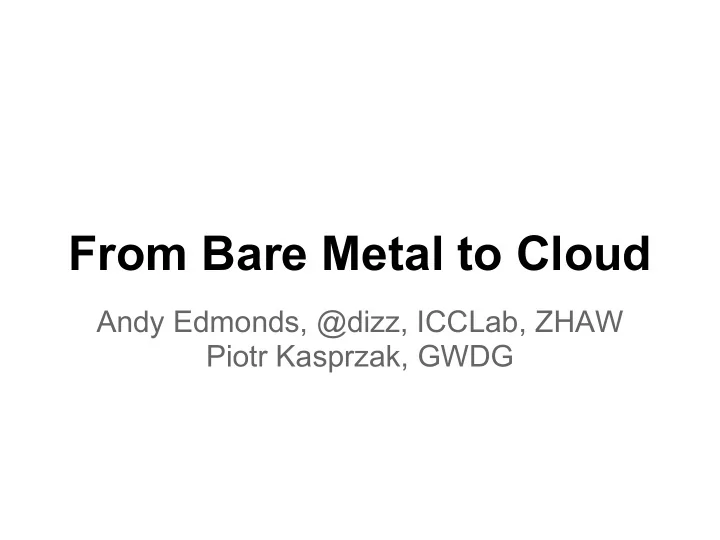

From Bare Metal to Cloud Andy Edmonds, @dizz, ICCLab, ZHAW Piotr Kasprzak, GWDG
Intros ICCLab GWDG ● Zurich University for ● Service Provider for Applied Sciences Max Planck Society ● Cloud Computing and University of Research Goettingen ● Research
We've Hardware for Cloud! GWDG Cloud Hardware Nodes 38 CPUs 152 Core 2432 Memory 9728 TB ICCLab Cloud Hardware Nodes 20 CPUs 80 Core 1280 Memory 1920 TB
Challenges or Problems? ● Clouds in essence are big data centres ○ Means lots of servers: ■ Manual configuration not an option ■ Automation is required
Challenges or Problems? Cloud frameworks can/are be complicated !
Challenges or Problems? ● But Clouds are " cool " - Aayyy! BUT ● How to deploy a "cloud" ○ with minimal user interaction ? ○ least number of "hands"? ○ across many servers ?
Challenges or Problems? ● How to share/standardise these processes? ○ Configuration - drift prevention ○ Testing - configuration, system functionality ○ Compliance - auditing, ITIL ○ Agility ○ Independence ■ Of physical/virtual deployment ■ Of infrastructure
Automation Toolchain
Automation Toolchain
Provision - OS rollout ? Baremetal VM
Provision - Foreman ● "Single Address For All Machines Lifecycle Management". ● Manages or proxies to DNS, DHCP, TFTP, Virtual Machines, PuppetCA, CMDB ● Integrates with Puppet (and acts as web front end to it). ● Provisions: ○ most flavours of *NIX, Windows ○ Virtual machines - libvirt, oVirt ○ Cloud Resources - Amazon EC2, VMware vCenter ● Has an API! :-)
Provision - Foreman Arch
Configuration - Puppet ● Declarative configuration language ○ Describe desired state of a system, not how to achieve it ○ Idempotence ● Different types of resources: software package, service, user, configuration file, mysql database, ... ● Dependencies can be formulated ● Grouping of resources by "class" concept: ○ Way of structuring your descriptions ● Abstraction layer for resources: ○ Independence from system type (different variants of linux, *bsd, mac os, windows, ...)
Configuration - Puppet's Model current desired state state ==? sync event
You describe system state... package {‘sshd’: ensure => current desired present, state state } ==? sync event
Puppet collects current state... rpm –q sshd package {‘sshd’: -------------------- ensure => desired current dpkg-query – present, state state search sshd } ==? sync event
Puppet compares... rpm –q sshd package {‘sshd’: -------------------- ensure => desired current dpkg-query – present, state state search sshd } absent != present sync event
Puppet synchronizes... rpm –q sshd package {‘sshd’: -------------------- ensure => current desired dpkg-query – present, state state search sshd } absent != present yum install sshd ------------------------ sync event apt-get install sshd
Puppet logs... rpm –q sshd package {‘sshd’: -------------------- ensure => current desired dpkg-query – present, state state search sshd } absent != present yum install sshd ------------------------ sync event apt-get install sshd state transition: absent -> present
A more complete puppet manifest class ssh::install { package { "openssh": ensure => present, } } class ssh::config { file { "/etc/ssh/sshd_config": ensure => present, owner => 'root', group => 'root', mode => 0600, source => "puppet:///modules/ssh/sshd_config", require => Class["ssh::install"], notify => Class["ssh::service"], } dependency } "if I change..." class ssh::service { service { "sshd": ensure => running, hasstatus => true, hasrestart => true, enable => true, require => Class["ssh::config"], } } class ssh { include ssh::install, ssh::config, ssh::service }
OpenStack @ 10,000m, Looks Easy!
OpenStack - The Ugly Close-up Complicated ● Many Services ● Many Dependencies Challenge to deploy ● 100's, 1000's of nodes? You need an automated toolchain!
Apple Moment!
Demo - What could go wrong?! Multi-node OpenStack Installation ● 1 controller node ○ "boss" ● 1 compute node ○ "worker1" ● More time? Easy to add more.
Demo: Deployment Architecture
Demo: OpenStack Component Deployment
Demo: Code/Config Details ● There are 2 roles ( hostgroups ) ○ openstack/controller - controller.pp ○ openstack/compute - compute.pp ● Both have different puppet manifests ○ Same 'icclab' module
What's in a controller node?
What's in a compute node?
Conclusions/Learnings ● Automation is essential ● Puppet codifies learnings, makes sharing easy ● Foreman a central management point, full lifecycle, adaptable to other services ● Dependence on infrastructure service management frameworks is lessened ○ Fast and efficient to install new ones with a tool chain ● Other than SLA guarantees, the only guarantee to maintain is the API between provider and customer and this is where standard APIs are need such as OCCI/CDMI/OVF.
Next Steps ● OpenStack to be rolled-out in ICCLab ○ New data centre, rolled-out within the month ○ Will include all OS Nova (Essex) and Swift services ■ Including OCCI interface ● puppetlab-nova pull-request available ● OpenStack to be rolled-out in GWDG ○ Will include all OS Nova (Essex) and Swift services ○ Providing production-quality OpenStack services
Thanks! Questions? Everything Presented is Documented at: http://www.cloudcomp.ch http://cloud.gwdg.de Including: - HOWTOs - Foreman, Puppet, OpenStack installs - Virtual Machine images
Backup slides
Toolchain map Dashboard ITIL CMDB Config-DB Puppet Git (SQL) Master Puppet Agent Puppet Agent VM Host
Foreman Arch Foreman OS artefacts Netinstall (PXE) TFTP DHCP kernel packages kickstart.ks DNS HTTP initrd VM VM Bare-Metal XEN KVM
Puppetmaster <-> agent interaction
What are the common config params?
GWDG Cloud topology Core EoR/MoR (End/Middle of Row) ToR (Top of Rack) CNA und FCoE (Converged Network Adapter/ Fiber Channel over Ethernet)
Recommend
More recommend